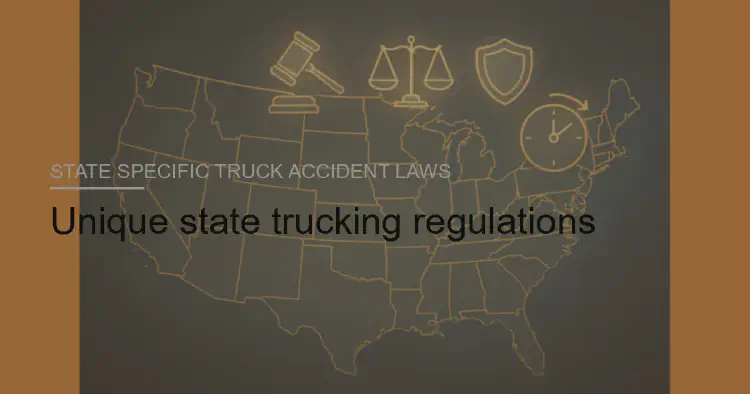Unique state trucking regulations
While federal rules under the FMCSA create a baseline for trucking operations, individual states impose additional regulations. These state-specific rules can significantly impact liability and compliance in truck accident cases.
- Truck Accident Law Team
- 2 min read
Article 3 of 6 in State-Specific Truck Accident Laws/

Unique State Trucking Regulations in the U.S.
Weight and Size Restrictions
- States may set stricter limits on truck weight, height, or length than federal minimums.
- Example: Certain states restrict oversized loads on specific highways or require special permits.
Speed Limits
- Truck speed limits often differ from those for passenger vehicles.
- Example: California enforces a 55 mph speed limit for most trucks, lower than for cars.
- Violations may serve as evidence of negligence in accidents.
Environmental Regulations
- Some states impose strict emissions and idling limits.
- Example: California’s CARB regulations mandate cleaner engines and limit idling time for trucks.
- Non-compliance can expose trucking companies to liability if linked to mechanical failure or unsafe operation.
Insurance Requirements
- States may require higher minimum liability coverage than federal law.
- Example: Some states mandate extra coverage for hazardous materials or intrastate carriers.
Licensing and Training Standards
- States may impose additional training, testing, or endorsements for commercial drivers beyond federal CDL requirements.
- Example: Hazardous material transport endorsements often have state-specific procedures.
Intrastate Hours of Service Rules
- Some states adopt their own Hours of Service (HOS) rules for trucks operating only within state borders.
- These may differ from FMCSA standards, affecting fatigue-related accident claims.
Impact on Truck Accident Cases
- Plaintiffs can use violations of state-specific regulations to strengthen negligence claims.
- Defense attorneys may argue compliance with federal law if state rules are less clear.
- Courts consider both federal preemption and state-level enforcement when evaluating liability.
Summary: Unique state trucking regulations—covering speed, weight, emissions, insurance, and licensing—play a crucial role in accident litigation. Violations of these rules can establish liability and significantly influence the outcome of truck accident cases.
You might also like:
- Tags:
- Trucking Companies
- Hours Service
- Accident Litigation
- Hazardous Materials
- Trucking Regulations
- Federal Law
- Service Hos
- State Level
- Impact Truck
- Defense Attorneys
- Liability Coverage
- Hos Rules
- Accident Claims
- Speed Limits
- Insurance Requirements
- Evidence Negligence
- States Require
- Fatigue Related
- Commercial Drivers
- Service Rules
- Minimum Liability
- States Impose
- State Specific
- Attorneys Argue
- Establish Liability
- Standards States
- Rules States
- Hours Service Hos
- Impact Truck Accident
- Hours Service Rules
- Minimum Liability Coverage
- Insurance Requirements States
- Service Hos Rules
- Liability Coverage Federal
- State Trucking Regulations
- Defense Attorneys Argue
- Play Crucial Role
- Coverage Hazardous Materials
- Requirements States Require
- States Require Higher
- States Impose Additional